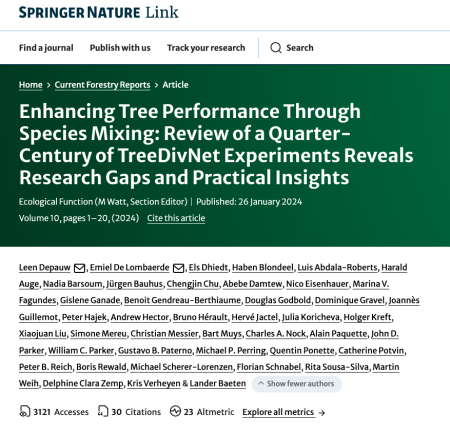
Resource description:
International ambitions for massive afforestation and restoration are high. To make these investments sustainable and resilient under future climate change, science is calling for a shift from planting monocultures to mixed forests. But what is the scientific basis for promoting diverse plantations, and what is the feasibility of their establishment and management? As the largest global network of tree diversity experiments, TreeDivNet is uniquely positioned to answer these pressing questions. Building on 428 peer-reviewed TreeDivNet studies, combined with the results of a questionnaire completed by managers of 32 TreeDivNet sites, we aimed to answer the following questions: (i) How and where have TreeDivNet experiments enabled the relationship between tree diversity and tree performance (including productivity, survival, and pathogen damage) to be studied, and what has been learned? (ii) What are the remaining key knowledge gaps in our understanding of the relationship between tree diversity and tree performance? and (iii) What practical insights can be gained from the TreeDivNet experiments for operational, real-world forest plantations?
Author/Contact:
- Leen Depauw,
- Emiel De Lombaerde,
- Els Dhiedt,
- Haben Blondeel,
- Luis Abdala-Roberts,
- Harald Auge,
- Nadia Barsoum,
- Jürgen Bauhus,
- Chengjin Chu,
- Abebe Damtew,
- Nico Eisenhauer,
- Marina V. Fagundes,
- Gislene Ganade,
- Benoit Gendreau-Berthiaume,
- Douglas Godbold,
- Dominique Gravel,
- Joannès Guillemot,
- Peter Hajek,
- Andrew Hector,
- Bruno Hérault,
- Hervé Jactel,
- Julia Koricheva,
- Holger Kreft,
- Xiaojuan Liu,
- Simone Mereu,
- Christian Messier,
- Bart Muys,
- Charles A. Nock,
- Alain Paquette,
- John D. Parker,
- William C. Parker,
- Gustavo B. Paterno,
- Michael P. Perring,
- Quentin Ponette,
- Catherine Potvin,
- Peter B. Reich,
- Boris Rewald,
- Michael Scherer-Lorenzen,
- Florian Schnabel,
- Rita Sousa-Silva,
- Martin Weih,
- Delphine Clara Zemp,
- Kris Verheyen &
- Lander Baeten